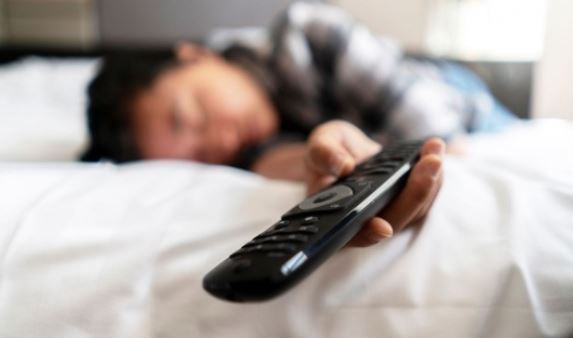Lifestyle
Why one should never fall asleep in front of the TV

Are you guilty of binge watching the many episodes of your favourite Netflix series at night? Well, this might be threatening your health!
Some people find that a screentime nudge to sleep or a background noise is calming or conducive to sleep.
But, is it really okay to sleep with the TV on? A lot of individuals have a habit of looking at a screen right before bed.
According to research, watching TV while you sleep can cause sleep disturbances and increase your chance of gaining weight.
Here’s what the study says
Referring to a study that Northwestern University School of Medicine in Chicago researchers carried out in 2022. Over 550 volunteers, ranging in age from 63 to 84, were asked to wear watches to bed in order for researchers to monitor the quantity of ambient light they were exposed to at night and how that affected their health. According to the study, there was a higher risk of diabetes, obesity, and hypertension among individuals who slept with even a small level of ambient lighting in the room.
They discovered that those who slept with low lighting—from a TV or even a smartphone—had higher insulin resistance the following morning, which affected their capacity to control blood sugar levels.
Light from TV screens can be detrimental for your health
Additionally, nighttime light lowers melatonin levels, which have been linked to poor sleep and an increased risk of diabetes and high blood pressure. I know some of you are thinking, ‘Why is that so bad for your health?’ because the three main risk factors for heart disease are excessive blood pressure, diabetes, and obesity.
How does blue light affect your circadian rhythm?
Melatonin is suppressed when exposed to artificial blue light, such as that which comes from your TV while you rewatch those episodes of F.R.I.E.N.D.S., which may make it harder for you to go asleep. Because of this, people who suffer from insomnia are occasionally advised to minimise their exposure to bright light in an effort to help their bodies get ready for sleep. Poor sleep patterns are responsible for bad recovery of the body and poor physical functioning.
Effects of screen time on the mind
On the other hand, young people can also have nightmares about what they had been watching on the TV before falling asleep. This may also lead to poor sleep quality and may be responsible for the poor mood and fatigue the next morning. Often when we doze off while watching TV, we aren’t aware of the posture we sleep in. This might lead to issues like a frozen shoulder or muscle pulls in the morning.
The takeaway
All these factors should motivate you to sleep without the noise disturbance and screen time. You must unwind and remember to take a pause before heading to bed. Drink a glass of water, meditate and chant or write a gratitude journal before you dive into slumber.










